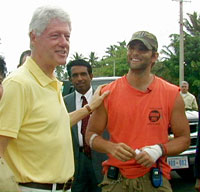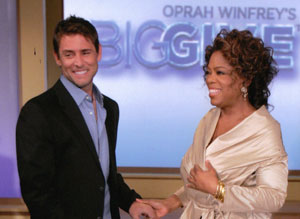 CAN-DO's unique approach to disaster relief has garnered it considerable attention in the media. CEO Eric Klein appeared on Oprah Winfrey's prime time television series The Big Give and has been interviewed numerous time on televised news shows and for newspaper and blog articles and podcasts.
CAN-DO's unique approach to disaster relief has garnered it considerable attention in the media. CEO Eric Klein appeared on Oprah Winfrey's prime time television series The Big Give and has been interviewed numerous time on televised news shows and for newspaper and blog articles and podcasts.
In addition, CAN-DO has received recognition from local governments for its innovative efforts in Sri Lanka following the 2004 tsunami and its work along the Gulf Coast in the wake of Hurricane Katrina. Individuals and organizations that have offered special recognition for CAN-DO's efforts include former President Bill Clinton, Oprah Winfrey's Angel Network, and Airline Ambassadors, an international philanthropic organization.
Presently, CAN-DO is heavily involved in ongoing relief efforts in Haiti, helping victims of the earthquake as they struggle to rebuild their homes, businesses, and communities. It has also been working with residents of the Crow Creek Indian Reservation as they struggle to preserve their culture and revitalize their community. Other recent projects include CAN-DO's Gulf Coast efforts, Iowa flood relief in 2008, and education development programs in Sudan and Rwanda.
Though primarily funded by the generous contributions of individual donors, CAN-DO receives financial support and other assistance from numerous businesses and organizations, including The North Face, the Interface Foundation, and Madison Resource Funding. CAN-DO also received a grant from Oprah Winfrey's Angel Foundation in 2008 to help fund its operations.
 From the Founder:
From the Founder:
"The CAN-DO Organization was created as a direct result of my disillusionment with charitable organizations and their failure to provide documentation detailing how all the generous contributions made to them have actually been spent.
When we see the carefully scripted scenario on TV news and infomercials of a starving child with a bloated belly; we can not help but be stirred to sympathy and compelled to donate what we can to the number flashing on our screens.
But how do we know whether or not our contributions are reaching that child – or any person in need for that matter?
I have come to believe there is too much money changing hands among these charities, and that the full sum donated as our initial act of compassion, is not the same amount being used to provide aid to the needy. I have discovered that these “NGO’s” are part of a highly unregulated business sector, and in my opinion, we need to start making non–profit organizations accountable for their actions, or more importantly, lack of them.
I want to emphasize that there are a number of highly reputable charities whose efforts DO provide real aid and relief and it is not my intention to discredit any one particular charity or to discourage charitable donations. That being said, I strongly feel that there must be a burden of proof placed on these charitable organizations to show the positive results that they are making and provide evidence of expenditures that achieved those efforts.
While in Sri Lanka after the 2004 tsunami, my goals were to assist and document the progress being made by CAN-DO and other relief efforts, as well as, assess and report on the overall situation in Sri Lanka since the deadly tsunami hit. I was also on a mission to find the answer to one key question, what I felt the media had failed to report - Where did all of the aid money go? I am sorry to say that much of what I experienced in Sri Lanka led to more questions instead of clear answers. I am very much aware of the bureaucracy and red tape, that has for some reason, become an acceptable excuse these days, but even bearing in mind such obstacles (and perhaps potential siphoning), there still remained no answer as to why so little actual aid, or accountability for this lack, was being seen by charitable organizations.
This issue led me to create CAN-DO.org (Compassion into Action Network – Direct Outcome Organization). My goal in creating this organization is quite simple – Let people offering donations to the needy get to actually see how their money is being spent. Give donors the opportunity and as a result, the satisfaction of seeing how their charitable gifts made an actual, physical difference. CAN-DO is not only a “direct outcome organization”, but will also be offering a Virtual Volunteering Program. This program will allow an individual or business to choose a charity or relief project that is important to them, donate, and track the relief work as it progresses all the way to the final result of their donations.
CAN-DO is very aware of our social, legal and financial responsibilities and we assure visitors to our web site that it is a safe and secure site to view. The CAN-DO Organization is not motivated by money, political or religious agendas, we are a charitable organization whose approach is simply to provide DIRECT, SUSTAINABLE RESULTS.
We appreciate your interest and support!"
Eric Klein, Founder - CAN-DO